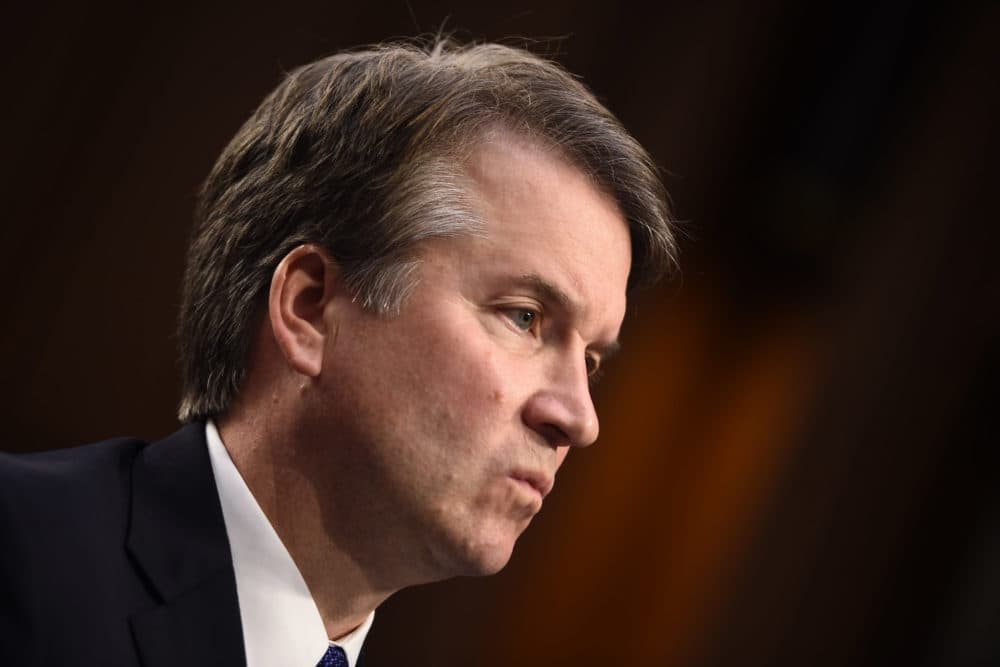Advertisement
Former Senate Majority Leader: If Kavanaugh Fails, Next Senate Will Decide Trump Pick
Resume
Supreme Court nominee Brett Kavanaugh will testify Monday in an open hearing before the Senate Judiciary Committee. So will Christine Blasey Ford, the woman who is accusing him of sexually assaulting her more than three decades ago.
Former Senate Majority Leader Tom Daschle says he thinks Kavanaugh's nomination is in "serious trouble."
"I think what we have to do is ascertain the facts as best we can," Daschle (@TomDaschle) tells Here & Now's Jeremy Hobson. "And that's going to be a process that takes several steps. But obviously things are very uncertain at this point. We hope we can clarify them in the next few days."
Interview Highlights
On the future of Kavanaugh’s nomination
"My hope is that we can avoid a circus, and the only way to do that it seems to me is to have an independent person, somebody who's neither a Republican or Democratic person, involved with the questioning. It could be two people, I suppose, but I think if you avoid both the kind of circus atmosphere that comes with all of the politicized questions and really get to the facts, you have at least a better opportunity to ascertain what the facts really are."
"She knew she was going to be ridiculed. She knew she was going to have an enormous amount of pressure put upon her, and yet she stepped forward. I have to admire that."
Former Senate Majority Leader Tom Daschle
On the similarities between Ford's allegations against Kavanaugh and Anita Hill's against then-Supreme Court nominee Clarence Thomas in 1991, and what he learned from that case
"Times have changed dramatically, and circumstances are different today, but in many respects, this is a sequel to the Anita Hill circumstances.
"What you learn first of all is that it's important with lifetime appointments to do as much as possible to get the facts as best we can to make a judgment, and when there's doubt, it seems to me we owe it to the courts and the country to give the benefit of the doubt to the courts in the country and not to the nominee.
"It takes a lot of courage for a woman to step forward, and under these circumstances especially. She knew she was going to be ridiculed. She knew she was going to have an enormous amount of pressure put upon her, and yet she stepped forward. I have to admire that. Obviously, we still need to know the facts, and I don't think anyone knows all of the facts at this point, but I think you have to give a good deal of benefit of the doubt to someone who does what she has done."
On the White House's reaction to the allegations, and why he thinks Trump has not criticized Ford
"I think they realize that that there's a great deal of uncertainty around all of this, and the more it's politicized, the more the uncertainty becomes a reality — a reality that they probably can't contend with. They have very little margin of error. All they need to have happen is one or two of their Republican colleagues who give the benefit of the doubt to the accuser, and it's over. So, I think they have to play it very carefully, and that's what they're doing."
On what he believes is at stake in Kavanaugh's nomination
"If this nomination fails, it's going to politicize the whole Supreme Court contest even more — I fear that. I think it's really unfortunate in our country that we've put so much predictability into the process and that hyperbolic rhetoric on both sides has done a real disservice, in my opinion, to the process itself, but this will certainly make the midterm elections even more politicized around the courts."
On whether Trump could nominate another justice before the November midterm elections, if Kavanaugh's nomination fails
"I don't think so. My guess is that given what few days remain in a lame duck I think would be an impossible set of circumstances to consider a second nominee. This bumps into the next Congress.
"My hope is that whether it's Democrats or Republicans, the president would see fit to nominate somebody that would be from the mainstream that would really have the benefit of broad support on both sides of the aisle. That used to happen routinely. It no longer happens, and that's one of the sad spectacles we're facing today."
On whether he agrees with an editorial by Hillary Clinton for The Atlantic in which she wrote American democracy is "in crisis"
"Absolutely. I'm very concerned about the state of our democracy. I think it's eroding dramatically. I was troubled a lot by a question asked of millennials not long ago: Is democracy necessary? And if I understand the results correctly, only about 30 percent said democracy was really essential today. That says all you need to know about our circumstances and how precarious our whole system of government is right now.
"It has a lot to do with President Trump. He in some ways is the symptom but also the cause. This has been going on for some time. It's just gotten a lot worse in the last two years."
This segment aired on September 18, 2018.